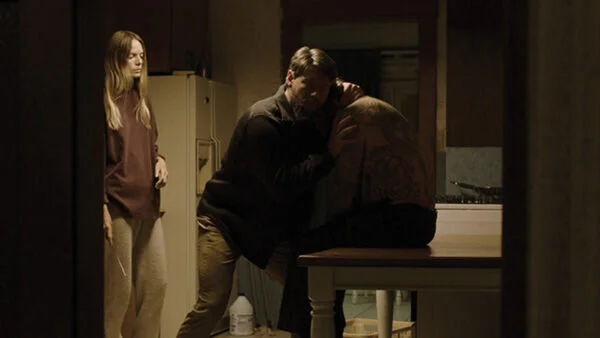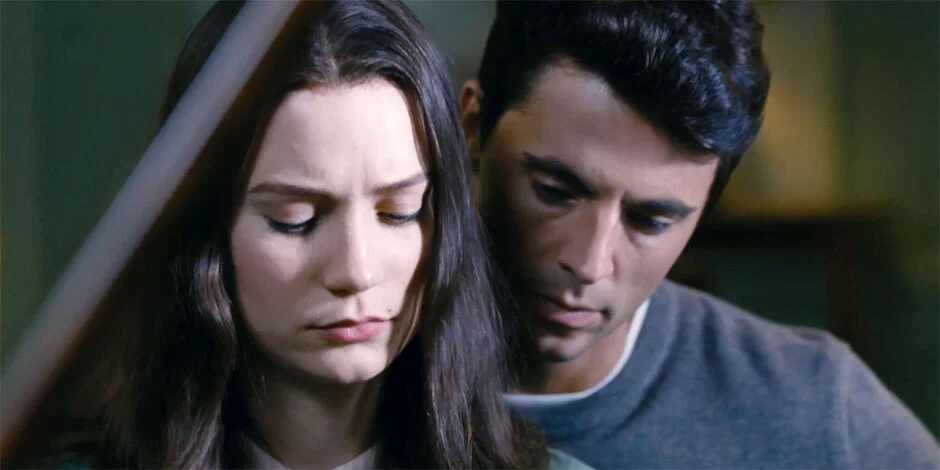[Editorial] The Blood of My Family: Dysfunctional Love in My Heart Can’t Beat Unless You Tell It To and Stoker
Complications with family are a commonplace issue on-screen and off-screen, it feels rare that you find a family that is not wrought with troubled history, strained relationships and buried secrets in which the foundations for so much is built. Even the most perfect nuclear families have their hidden depravities lurking in the basement in which they wrap-up and add a bow on top, presenting to the world something that looks like a wonder it is not.
The concept of family has always felt confronting and perturbed from every standpoint; there are these people in which you are forced, and feel obligated to have attachments with and provide support, care and love, yet sometimes all instincts say that they are people you should stay far away from. In recent times, my therapist suggested that it would be better for my mental health to keep a clear divide and form of separation between myself and some of my family members. It was within this advice that the devastating effects of family, even if unintentionally, came to light and how they can impact a person and have a seriously detrimental effect on their wellbeing. As much as we all love our families, more times than not, they are unfortunately not the healthiest form of relationship for us. For decades, horror films have clearly demonstrated the trials and tribulations faced through familial connections, with devastating consequences that often result in bleak endings.
One of the most recent depictions of this on-screen desecration of family has been immortalised in Jonathan Cuartas’ heartbreakingly beautiful My Heart Can’t Beat Unless You Tell It To. Often described as mumblecore, the film may seem to meander along without much purpose to certain audiences, however, there was something so seemingly haunting and real within the film that truly spoke to me on a personal level, one that will feel relevant to so many with complicated family dynamics. In a darkly mediocre house, two siblings find themselves beholden to their younger brother and his debilitating sickness which forces the siblings to undertake atrocities that could only be committed by those with unconditional love. Thomas needs human blood to sustain his person, and therefore Jessie and Dwight must prey on the lives of others to keep him nourished and alive. This is a clear representation of the extremes humans will go to in order to protect and care for those that they love, regardless of the severity of the acts committed and the negative impact that it has on their own personal wellbeing. Throughout My Heart Can’t Beat Unless You Tell It To, the audience are constantly reminded of the desperations inflicted by family and how horror can lie in feelings that are perceived as compulsory.
The film might not completely allude to the fact that Thomas is essentially suffering from vampirism, yet it is easily read this way with his insatiable need to consume the blood of others. This nuance allows the audience to build their own narrative into his sickness; whether pulling on familarial similarities or simply viewing the sickness as a dependency and craving of selfishness to have the unconditional love of his siblings at all times. In a comparative portrayal of estranged and problematic families, Park Chan-Wook’s 2013 thriller-come-horror film Stoker, comes to mind. Vulnerable, impressionable with a curiosity that causes trouble, India is fascinated by her Uncle Charlie who comes to stay with her and her mother, Evelyn, when the father is killed in a fatal car crash. Even though the tension between the trio is rising and falling consistently, India cannot help but find Uncle Charlie’s erratic and unpredictable behaviour alluring to the point of attraction, regardless of his blood-related status. Even though the film does not specifically allude to vampirism in any prominent way, there are small hints scattered throughout, including the title of the film itself. Stoker upholds the atmosphere throughout, showing the complicated battle for attention between mother and daughter, alongside the unconditional love they both have for one another, and uncomfortably for Uncle Charlie. Vampirism has always had connotations towards incestous behaviour amongst family; showing there is a fine line between what is acceptable and what is not, something that is often crossed when morality is waived by an undying need and craving for the taste of another human.
Both Stoker and My Heart Can’t Beat Unless You Tell It To use vampirism to depict the complicated yet connected relationships that families have. The people within our families can technically be classified as strangers or acquaintances, people that we do not really know their true selves, but the boundaries of ‘family’ clearly states that unconditional love and a bond by blood means we must destroy everything and everyone around us in order to keep the family intact. But both films show that everyone has their own agendas, ones that are purposefully self-serving and self-sufficient, which ultimately lead to the devastation of other family members who have doted so selfishly and with only tender care in their hearts. In My Heart Can’t Beat Unless You Tell It To, it is brother Dwight who begins to see past the fact that Thomas is his brother and he loves it, and starts to see that although sweet and gentle in moments, Thomas is ruled by his bloodlust and therefore can never truly be a part of the family, instead he is slowly and gradually ripping them apart - both metaphorically and eventually quite literally. In Stoker we see India’s wall of smoke and mirrors shattered when she uncovers the truth behind Charlie’s dark past, discovering that he too has a penchant for death and decay, one that he cannot escape from. But in both films, these afflictions are accepted to an extent, with those relatives constantly feeling drawn back to their strong and intense emotions for the family member; to overrule emotions with morality is not a simple task when it is your own flesh and blood.
Both Dwight and India are seemingly coaxed back to Thomas and Charlie respectively, allowing themselves to once more become beholden to the unconditional love they feel that should in essence prevent them from succumbing to the drowning feeling of desperation in which the relatives evoke. ‘Blood is thicker than water’ has been interpreted both as a means to suggest that the blood of one's family holds the strongest bond, but others have referenced that the blood of non-family ties is stronger than the water of the womb, suggesting family ties can be easily cut when needed. In the case of both My Heart Can’t Beat Unless You Tell It To and Stoker, it could be interpreted that vampiric craving for blood is thicker and stronger than any familial tie, and therefore both Dwight and India will always fall prey to their animalistic family members who are beholden to their consumption. Regardless of their overwhelming emotions, both protagonists find themselves realising that they cannot allow their unconditional love to sidestep all moralities and humanity, and therefore they both take stakes to their own hearts and instead eradicate their connections with Thomas and Charlie to ensure the monsters do not succeed.
As humans we are brought into this world believing that our families are everything to us, that we hold them dear and can never feel negativity towards them, but often our families are not the comfort we deserve. Blood is always thicker, whether from a vampiric standpoint or whether in reference to the ones we purposefully choose to replicate our family, it will always be internally battling to realise that sometimes distanced family relationships are far healthier than the unconditional love we believe must be upheld.







![[Editorial] 5 Slasher Short Horror Films](https://images.squarespace-cdn.com/content/v1/5fe76a518d20536a3fbd7246/1696358009946-N8MEV989O1PAHUYYMAWK/Screenshot+2023-10-03+at+19.33.19.png)
![[Ghouls Podcast] Maniac (2012) with Zoë Rose Smith and Iona Smith](https://images.squarespace-cdn.com/content/v1/5fe76a518d20536a3fbd7246/1696356006789-NYTG9N3IXCW9ZTIJPLX2/maniac.jpg)
![[Editorial] If Looks Could Kill: Tom Savini’s Practical Effects in Maniac (1980)](https://images.squarespace-cdn.com/content/v1/5fe76a518d20536a3fbd7246/1694952175495-WTKWRE3TYDARDJCJBO9V/Screenshot+2023-09-17+at+12.57.55.png)
![[Editorial] Deeper Cuts: 13 Non-Typical Slashers](https://images.squarespace-cdn.com/content/v1/5fe76a518d20536a3fbd7246/1694951568990-C37K3Z3TZ5SZFIF7GCGY/Curtains-1983-Lesleh-Donaldson.jpg)
![[Editorial] Editor’s Note: Making a slash back into September](https://images.squarespace-cdn.com/content/v1/5fe76a518d20536a3fbd7246/1694354202849-UZE538XIF4KW0KHCNTWS/MV5BMTk0NTk2Mzg1Ml5BMl5BanBnXkFtZTcwMDU2NTA4Nw%40%40._V1_.jpg)
![[Editorial] 8 Mind Horror Short films](https://images.squarespace-cdn.com/content/v1/5fe76a518d20536a3fbd7246/1693504844681-VPU4QKVYC159AA81EPOW/Screenshot+2023-08-31+at+19.00.36.png)
![[Editorial] Eat Shit and Die: Watching The Human Centipede (2009) in Post-Roe America ](https://images.squarespace-cdn.com/content/v1/5fe76a518d20536a3fbd7246/1691245606758-4W9NZWE9VZPRV697KH5U/human_centipede_first_sequence.original.jpg)
![[Editorial] Top 15 Female-Focused Mind Horror Films](https://images.squarespace-cdn.com/content/v1/5fe76a518d20536a3fbd7246/1691247166903-S47IBEG7M69QXXGDCJBO/Image+5.jpg)
![[Editorial] 8 Body Horror Short films](https://images.squarespace-cdn.com/content/v1/5fe76a518d20536a3fbd7246/1690838270920-HWA5RSA57QYXJ5Y8RT2X/Screenshot+2023-07-31+at+22.16.28.png)













I can sometimes go months without having a panic attack. Unfortunately, this means that when they do happen, they often feel like they come out of nowhere. They can come on so fast and hard it’s like being hit by a bus, my breath escapes my body, and I can’t get it back.